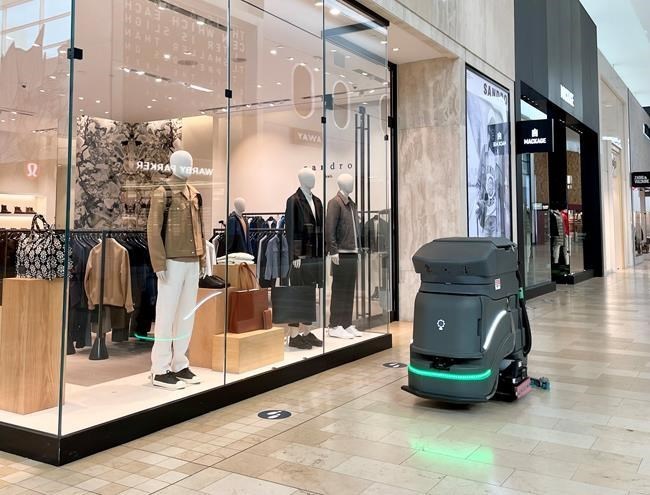Some health officials will tell you that aside from the COVID-19 vaccines, masks are the best protection from a virus that is spread through the air.
But many people are also still focused on making sure they continuously wash their hands and that they only visit places that have been cleaned.
This is why so many businesses and government institutions, such as schools, tout their efforts to clean and have hand sanitizers available.
For Burnaby shopping centres, it takes a lot of effort to keep things clean – especially the floors.
Autonomous floor scrubbers are increasingly as COVID-19 sharpens the public’s focus on the cleanliness of public spaces.
Faizan Sheikh, co-founder and his co-founder Pablo Molina launched Avidbots in 2014 after graduating from Mechatronics Engineering — or robotics — at the University of Waterloo.
The entrepreneurs, originally from Pakistan and Ecuador, both grew up fascinated with shows like "The Jetsons" and Japan’s "Jiban" and wanted to see robotics in everyday life.
“We were frustrated that robotics weren’t going anywhere, that we weren’t surrounded by robots everywhere,” Faizan said. “It came to a point where we could actually do something about it or stop talking about it.”
They focused on commercial cleaning to start and developed one of the world's first commercial robotic floor cleaners.
The autonomous floor scrubber — what some have described as a robotic mini-Zamboni —cleans up to 3,900 square metres an hour. It’s outfitted with multiple sensors to detect and avoid obstacles in its path, the company says.
Unlike traditional walk-behind floor scrubbers, the Neo only needs a human to press start and can operate for up to six hours without a recharge.
In commercial spaces with dedicated cleaning professionals, human cleaners are able to increase the frequency of cleaning and sanitizing in other areas like washrooms and high-touch surfaces, he says.
The robotic floor scrubber also provides detailed cleaning reports.
“You can guarantee that cleaning happens,” Faizan says. “When the pandemic happened and even still now, retailers are talking about the efforts they are taking to keep customers safe, including better cleaning and sanitation. This is a proof point.”
The future of clean surfaces is also arriving with the use of copper.
SFU Burnaby and also UBC are the latest post-secondary universities to install antimicrobial copper patches on places like door handles and push bars to provide an added layer of protection for students and staff
Health Canada-certified Copper Clean Antimicrobial Surface Patches, manufactured by the Canadian company Coptek, continuously kill 99% of bacteria left behind on surfaces.
Installations at SFU’s Burnaby and Surrey campuses are complete, with more patches to be installed at SFU Vancouver and Burnaby student residence buildings in the coming weeks. More than 1,600 copper patches will be installed across SFU facilities this fall. Copper patches have also been installed at University of British Columbia’s Faculty of Applied Science buildings.
This news follows a recent announcement that BCIT installed more than 1,000 copper patches across its Burnaby campus to support health and safety measures.
The installations are funded by Teck through its Copper & Health program. Teck has also supported the installation of antimicrobial copper surfaces on transit and in B.C. hospitals, including Vancouver General Hospital, Lions Gate Hospital and Kootenay Boundary Regional Hospital. Copper surfaces will also be installed at the Teck Emergency Department at the new St. Paul's Hospital in Vancouver.
- With files from the Canadian Press



